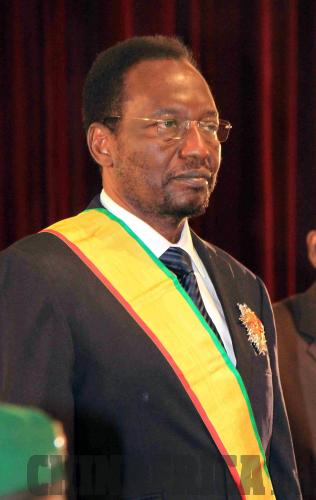|
|

|
|
NEW LEADER: Diouncounda Traore is sworn in as Mali's interim president |
Cause of coup
The question on many people's mind is why a relatively peaceful country that took a step into democracy back in 1992, with the promulgation of a new constitution, could make such an abrupt slide into chaos and anarchy.
Experts on conflict and governance told ChinAfrica that the genesis of the fighting in Mali has its roots in the Arab Spring and the effect the Libyan revolution had on the lands of Tuareg nomads, which stretches across the Sahara from Mali to Niger and all the way to Algeria.
Ghada Shahbender of the Egyptian Organization of Human Rights told ChinAfrica that the rebellion in Mali had all shades of a "clash between nomadism and modernism."
She said that the Tuareg are by nature reclusive, so that, when they go to a place, very few of them find it easy to morph into the local way of life.
"The Tuareg have this peculiar character. They are usually persecuted to the extent that they isolate themselves; and at times, they isolate themselves for fear of persecution," said Shahbender.
But that doesn't explain their fighting in Libya, from where they got training and arms to come back home and wage a war for an independent republic of Azawad. So, Shahbender reckoned that the proliferation of small arms, undoubtedly a big security game-changer in North Africa, was behind the fighting and rise in violent crimes in the north.
"What happened is that whole armories were opened and arms given to civilians. That has a potential to cause chaos," she said.
Professor Stephen Zunes, a knowledgeable scholar of politics and international studies at the University of San Francisco, backed this view.
"What happened was that the war in Libya resulted in arms caches going into the hands of Tuareg tribesmen who brought them into Tuareg-populated areas of northern Mali, which dramatically escalated what had been a low-level rebellion, prompting the Malian armed forces to claim the country needed military rule to quash the rebellion," Zunes told ChinAfrica.
Road ahead
So what next for Mali?
The country was scheduled to hold presidential polls on April 29. The coup made that date untenable. Now the new civilian president has to quash the rebellion and also mop up the proliferation of arms.
The Tuareg, fighting under the group, National Movement for the Liberation of Azawad (MNLA), have already declared independence. Many ethnic groups in Mali are said to be confused as to why a group that is a minority in most senses would be pushing for secession in a country of 14 million people.
However, a stable government seems like the only answer to the woes of the MNLA, which is said to have joined forces with another group with links to the global terror network, al Qaeda in the Islamic Maghreb.
"In any region awash with arms and local militias interested in carving out their little sovereign spheres, the stability of any democracy can't be assured," Jack DuVall, President of the U.S.-based International Center of Non-violent Conflict, told ChinAfrica on the Mali crisis.
"But even the threat of a break-away province dominated by an armed group doesn't justify a military coup against democratically elected leader, because the people weren't consulted. The faster a democratically elected leader is back in power in Mali, the more standing and influence its government will have regionally and internationally to deal with violent separatists," DuVall said.
Wetangula also believes coups are old-fashioned.
"Coup d'etats are unacceptable and must be condemned by all, Mali being no exception. The flimsy reasons advanced by the coup makers and executioners are mere excuses," said Wetangula as he praised the UN, AU and ECOWAS for proving that there was no room for military governments.
(Reporting from Kenya)
|